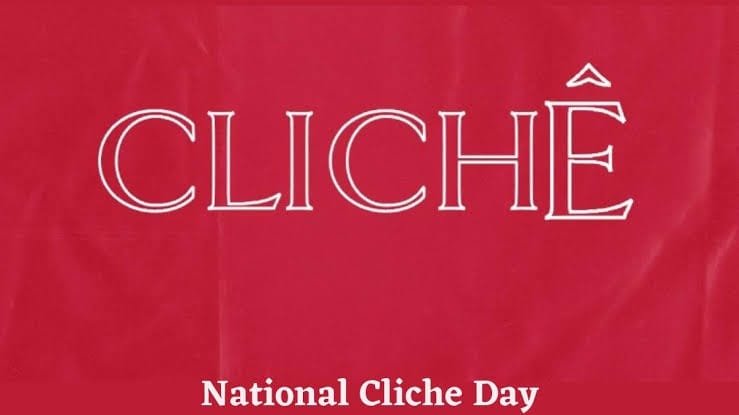Cliche Day – November 3, 2022, history, significance
Cliché Day is celebrated every year on November 3 throughout the country. This day is a day that celebrates the cliché and the usefulness of clichés in everyday life. Clichés are clichés because they’re overused, and they can be very irritating — but that’s part of the fun. They’re predictable and funny because everyone knows they’re coming.
They’re funny and enjoyable, and this day is a great day to work them into your conversations. More importantly, everyone understands clichés and they convey your point easily and quickly. Used well, clichés can facilitate conversation and be great ice breakers, so go ahead and celebrate them!
HISTORY OF CLICHE DAY

Cliché Day is celebrated on November 3 every year across the country. This day celebrates how useful, annoying, and fun cliches are by incorporating them into the conversation and the arts for the entire day. Clichés are elements of a play, book, or movie — or sayings, or ideas that have been used so often that they’ve completely lost their original impact. Most clichés start as very impactful and transformative sayings that have an incredible impact on the audience the first time they’re said.
Because they have such a great influence, people start saying them and reusing them to the point where they start getting annoying. Like great catchy songs, cliches become earworms that refuse to leave. Clichés are usually truisms or stereotypes that are stated in a particular way.
They may or may not be true, but are repeated often enough that most people know and believe them. An important aspect of cliches is that enough people need to be familiar with the idea or the statement presented in that particular way. It is only when people have come across the same thing in the same way over and over again that it starts to grate on them.
Today, people who use cliches unironically are seen as lacking inspiration or originality and considered to be unskilled at their art — whatever it may be. However, cliches have their own place. Used well, they can help communicate ideas to people, and they’re great fun to use ironically.
Cliché Day is a great opportunity to celebrate cliches — by considering the original impact they might have had to use them to annoy people or familiarly communicate new ideas.
CLICHE DAY TIMELINE
1825
The Word is Borrowed from French
Printers borrow the word ‘cliché ’ from French to refer to the cast plate or block print used to replicate type or images.
1880s
The Meaning of Cliché Evolves
With consistent use by printers, the word ‘cliché’ comes to be used for ready-made phrases that are repeated often.
1960s
Thought-Terminating Cliches Identified
American psychiatrist Robert Jay Lifton identifies thought-terminating clichés are those used to end an argument.
2000s
Cliché Day Begins to be Celebrated
Amused by clichés, the American people begin to celebrate the joy of using clichés to annoy and communicate with people.
CLICHE DAY ACTIVITIES
Share your favorite clichés
Make a list of all your favorite clichés and share them with your friends and family. You can even put them in an article and share them on the internet.
Use the hashtags
#ClicheDay is a great way to share your favorite cliches online. Note all the cliches you hear in a day and share them on social media with the hashtag.
Play a cliché game
Get your friends together or play a cliché game with yourself. Count the number of clichés you can get into a conversation before people catch on.
5 FACTS ABOUT CLICHÉS THAT WILL SURPRISE YOU
The word is actually an onomatopoeia
The word ‘cliché’ comes from the sound that the casting plate would make when it was used.
Clichés lose meaning
Because people are so annoyed by clichés, they lose their original meanings entirely and their meanings are ignored.
Clichés are used to prevent thinking
Thought-preventing clichés are often used by people to shut down a conversation so that the other person can’t argue anymore since clichés are accepted as truth.
A lot of common phrases aren’t cliches
There are many phrases used commonly in the English language but aren’t treated as clichés, according to researcher Orin Hargraves.
Many idioms are clichés
Most clichés are idioms — however, the two are different as clichés can also be ideas or concepts.
WHY WE LOVE CLICHE DAY
We love using clichés
We think clichés get a bad rep just because they’re overused. We love using them and love having a day to use them.
We want to celebrate language
It’s so interesting to see how language develops and clichés are a part of that. We want to celebrate and have fun with how clichés affect communication.
We want to understand clichés
We’re still not sure about what makes a cliché a cliché. We want to find out how different people feel about them, and what makes them eventually lose meaning.



